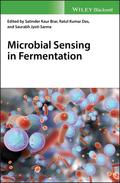Microbial Sensing in Fermentation

1. Auflage Dezember 2018
344 Seiten, Hardcover
Wiley & Sons Ltd
A comprehensive review of the fundamental molecular mechanisms in fermentation and explores the microbiology of fermentation technology and industrial applications
Microbial Sensing in Fermentation presents the fundamental molecular mechanisms involved in the process of fermentation and explores the applied art of microbiology and fermentation technology. The text contains descriptions regarding the extraordinary sensing ability of microorganisms towards small physicochemical changes in their surroundings. The contributors -- noted experts in the field -- cover a wide range of topics such as microbial metabolism and production (fungi, bacteria, yeast etc); refined and non-refined carbon sources; bioprocessing; microbial synthesis, responses and performance; and biochemical, molecular and extra/intracellular controlling.
This resource contains a compilation of literature on biochemical and cellular level mechanisms for microbial controlled production and includes the most significant recent advances in industrial fermentation.
The text offers a balanced approach between theory and practical application, and helps readers gain a clear understanding of microbial physiological adaptation during fermentation and its cumulative effect on productivity. This important book:
* Presents the fundamental molecular mechanisms involved in microbial sensing in relation to fermentation technology
* Includes information on the significant recent advances in industrial fermentation
* Contains contributions from a panel of highly-respected experts in their respective fields
* Offers a resource that will be essential reading for scientists, professionals and researchers from academia and industry with an interest in the biochemistry and microbiology of fermentation technology
Written for researchers, graduate and undergraduate students from diverse backgrounds, such as biochemistry and applied microbiology, Microbial Sensing in Fermentation offers a review of the fundamental molecular mechanisms involved in the process of fermentation.
Chapter 2: Cellular events of microbial production
Chapter 3: Microbial metabolism in a refined carbon source
Chapter 4: Non -refined carbon sources and microbial performance
Chapter 5: Cellular vs Biochemical control over microbial product
Chapter 6: Pre-Treatment of alternative carbon source
Chapter 7: Microbial Metabolic pathways in the production of value added products
Chapter 8: Communication for a collective response to environmental stress
Chapter 9: Biochemical and Cellular events in controlling microbial performance
Chapter 10: Qualitative Vs Quantitative control over microbial products
Chapter 11: Microbes and their products as sensors in industrially important fermentation
Chapter 12: Practical aspects and case studies of industrial scale fermentation
Chapter 13: Future Market and policy initiatives of new high value products
Satinder Kaur Brar: Institut national de la recherche scientifique, Centre ??? Eau Terre Environnement, Québec, Canada
Ratul Kumar Das: TERI-Deakin Nanobiotechnology Centre, Biotechnology and Management of Bioresources Division, The Energy and Resources Institute, Haryana, India
Saurabh Jyoti Sarma: Department of Biotechnology, Bennett University, Greater Noida, Uttar Pradesh, India


